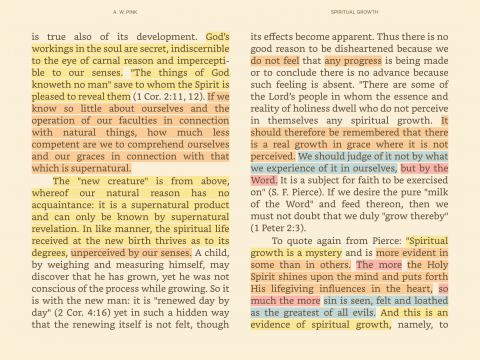
In considering the above difficulty the following points should be carefully weighed: In the first place, no sinner, while he is in this world, knows for certain, nor can he know, that he is a “vessel of wrath fitted to destruction.” This belongs to the hidden counsels of God to which he has not access. God’s secret will is no business of his; God’s revealed will (in the Word) is the standard of human responsibility. And God’s revealed will is plain. Each sinner is among those whom God now “commandeth to repent” (Act 17:30). Each sinner who hears the Gospel is “commanded” to believe (1Jo 3:23). And all who do truly repent and believe are saved. Therefore, is every sinner responsible to repent and believe.
In the second place, it is the duty of every sinner to search the Scriptures which “are able to make thee wise unto salvation” (2Ti 3:15). It is the sinner’s “duty” because the Son of God has commanded him to search the Scriptures (Joh 5:39). If he searches them with a heart that is seeking after God, then does he put himself in the way where God is accustomed to meet with sinners. Upon this point the Puritan Thomas Manton has written very helpfully.
“I cannot say to every one that ploweth, infallibly, that he shall have a good crop; but this I can say to him, It is God’s use to bless the diligent and provident. I cannot say to every one that desireth posterity, Marry, and you shall have children; I cannot say infallibly to him that goeth forth to battle for his country’s good that he shall have victory and success; but I can say, as Joab (1Ch 19:13) ‘Be of good courage, and let us behave ourselves valiantly for our people and the cities of our God: and let the LORD do that which is good in his sight.’ I cannot say infallibly you shall have grace; but I can say to every one, Let him use the means, and leave the success of his labor and his own salvation to the will and good pleasure of God. I cannot say this infallibly, for there is no obligation upon God. And still this work is made the fruit of God’s will and mere arbitrary dispensation—‘Of his own will begat he us by the word of truth’ (Jam 1:18). Let us do what God hath commanded, and let God do what He will. And I need not say so; for the whole world in all their actings are and should be guided by this principle. Let us do our duty, and refer the success to God, Whose ordinary practice is to meet with the creature that seeketh after Him; yea, He is with us already; this earnest importunity in the use of means proceeding from the earnest impression of His grace. And therefore, since He is beforehand with us, and hath not showed any backwardness to our good, we have no reason to despair of His goodness and mercy, but rather to hope for the best” (Works, Vol. XXI, page 312).
God has been pleased to give to men the Holy Scriptures which “testify” of the Saviour, and make known the way of salvation. Every sinner has the same natural faculties for the reading of the Bible as he has for the reading of the newspaper; and if he is illiterate or blind so that he is unable to read he has the same mouth with which to ask a friend to read the Bible to him, as he has to enquire concerning other matters. If, then, God has given to men His Word, and in that Word has made known the way of salvation, and if men are commanded to search those Scriptures which are able to make them wise unto salvation, and they refuse to do so, then it is plain that they are justly censureable, that their blood lies on their own heads, and that God can righteously cast them into the Lake of Fire.
In the third place, should it be objected, admitting all you have said above, Is it not still a fact that each of the non-elect is unable to repent and believe? The reply is, Yes. Of every sinner it is a fact that, of himself, he cannot come to Christ. And from God’s side the “cannot” is absolute. But we are now dealing with the responsibility of the sinner (the sinner foreordained to condemnation, though he knows it not), and from the human side the inability of the sinner is a moral one, as previously pointed out. Moreover, it needs to be borne in mind that in addition to the moral inability of the sinner there is a voluntary inability, too. The sinner must be regarded not only as impotent to do good but as delighting in evil. From the human side, then, the “cannot” is a will not; it is a voluntary impotence. Man’s impotence lies in his obstinacy. Hence, is everyone left “without excuse,” and hence, is God “clear” when He judgeth (Psa 51:4), and righteous in damning all who “love darkness rather than light.”
That God does require what is beyond our own power to render is clear from many Scriptures. God gave the Law to Israel at Sinai and demanded a full compliance with it, and solemnly pointed out what would be the consequences of their disobedience (see Deu 28). But will any readers be so foolish as to affirm that Israel were capable of fully obeying the Law! If they do, we would refer them to Romans 8:3 where we are expressly told, “For what the law could not do, in that it was weak through the flesh, God sending his own Son in the likeness of sinful flesh, and for sin, condemned sin in the flesh.”
Come now to the New Testament. Take such passages as Matthew 5:48, “Be ye therefore perfect, even as your Father which is in heaven is perfect.” 1 Corinthians 15:34. “Awake to righteousness, and sin not.” 1 John 2:1, “My little children, these things write I unto you, that ye sin not.” Will any reader say he is capable in himself of complying with these demands of God? If so, it is useless for us to argue with him.
But now the question arises, Why has God demanded of man that which he is incapable of performing? The first answer is, Because God refuses to lower His standard to the level of our sinful infirmities. Being perfect, God must set a perfect standard before us. Still we must ask, If man is incapable of measuring up to God’s standard, wherein lies his responsibility? Difficult as it seems, the problem is nevertheless capable of simple and satisfactory solution.
Man is responsible to (first) acknowledge before God his inability, and (second) to cry unto Him for enabling grace. Surely this will be admitted by every Christian reader. It is my bounden duty to own before God my ignorance, my weakness, my sinfulness, my impotence to comply with His holy and just requirements. It is also my bounden duty, as well as blessed privilege, to earnestly beseech God to give me the wisdom, strength, grace, which will enable me to do that which is pleasing in His sight; to ask Him to work in me “both to will and to do of his good pleasure” (Phi 2:13).
In like manner, the sinner, every sinner, is responsible to call upon the Lord. Of himself he can neither repent nor believe. He can neither come to Christ nor turn from his sins. God tells him so; and his first duty is to “set to his seal that God is true.” His second duty is to cry unto God for His enabling power; to ask God in mercy to overcome his enmity and “draw” him to Christ; to bestow upon him the gifts of repentance and faith. If he will do so, sincerely from the heart, then most surely God will respond to his appeal, for it is written, “For whosoever shall call upon the name of the Lord shall be saved” (Rom 10:13).
Suppose I had slipped on the icy pavement late at night, and had broken my hip. I am unable to arise; if I remain on the ground I must freeze to death. What, then, ought I to do? If I am determined to perish I shall lie there silent; but I shall be to blame for such a course. If I am anxious to be rescued I shall lift up my voice and cry for help. So the sinner, though unable of himself to rise and take the first step toward Christ, is responsible to cry to God, and if he does (from the heart) there is a Deliverer to hand. God is “not far from every one of us” (Act 17:27); yea, He is “a very present help in trouble” (Psa 46:1). But if the sinner refuses to cry unto the Lord, if he is determined to perish, then his blood is on his own head, and his “damnation is just” (Rom 3:8).
A.W. Pink. The Sovereignty of God.



